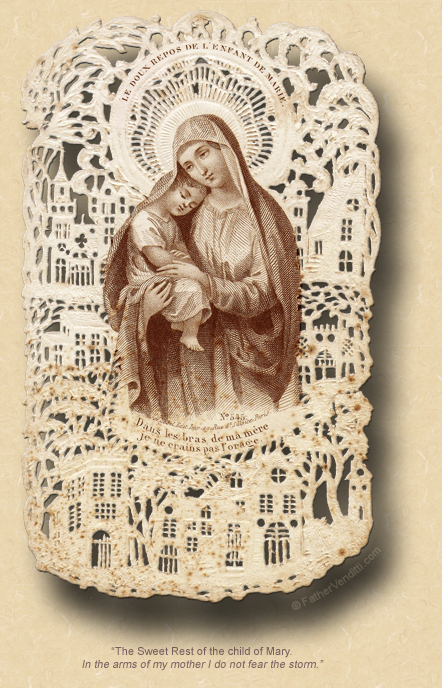Do Whatever He Tells You.
The Second Sunday of Ordinary Time.
Lessons from the tertiary dominica, according to the ordinary form of the Roman Rite:
• Isaiah 62: 1-5.
• Psalm 96: 1-3, 7-10.
• I Corinthians 12: 4-11.
• John 2: 1-11.
The Second Sunday after Epiphany.
Lessons from the dominica, according to the extraordinary form of the Roman Rite:
• Romans 12: 6-16.
• Psalm 106: 20-21.
• John 2: 1-11.
FatherVenditti.com
|
 12:54 PM 1/16/2022 — It’s a wedding. Cana is a very short distance from Nazareth, so it’s safe to assume that one or both of the people getting married are good friends or even relations of the Blessed Virgin Mary; and, Jesus has been invited as well. 12:54 PM 1/16/2022 — It’s a wedding. Cana is a very short distance from Nazareth, so it’s safe to assume that one or both of the people getting married are good friends or even relations of the Blessed Virgin Mary; and, Jesus has been invited as well.
It’s interesting to note that Mary is pretty much silent throughout the Gospel. In fact, if memory serves, She only speaks four times. The first time Her response to the angel at the Annunication, the second the Magnificat at the Visitation, the third her rebuke to Her Son after finding Him in the Temple as a child,—“Your father and I have been searching for You”—and the last what we read in the Gospel lesson today: “They have no wine.”
And our first reaction, I think, is to be uncomfortable with our Blessed Lord’s remonstrance of His Mother: “Woman, how does your concern affect me? My hour has not yet come” (John 2: 4 NABRE). It seems that our Lord is on the cusp of refusing to do anything, but Mary seems to assume differently since she immediately says to the servants, “Do whatever He tells you.” He does do what our Blessed Mother wants, and saves the day by making sure that the bride and groom have plenty of wine on hand to keep their guests drunk and happy.
Saint John specifically mentions that there were six stone jars on hand, each holding twenty or thirty gallons. Our Lord commands that they be filled with water to the brim; so that means our Lord created between one hundred and one hundred sixty gallons of wine that day. I would think that would be enough. And, according to the comment made with the chief steward, it was the best wine imaginable. How could it not be? It was created by our Lord.
Now, the analogies and metaphors are almost too simple to require explanation; but, since it’s Sunday you need a homily, and if I didn’t you’d want your money back. And certainly one of the lessons we can draw from this episode comes from the sheer abundance of the wine created.  I don’t care how many people you’ve invited to your wedding; you don’t need a hundred sixty gallons of wine. We can make the same observation about the multiplication of the loaves (cf. John 6: 12-13), in which, after our Lord takes five loaves of bread and two fish and has them distributed, the Apostles collect twelve full baskets of left-overs. Our Lord is always providing so much more than is needed, and He wants to do the same for us; but, we have to do our part. In both instances—the miracle of the loaves and the wedding at Cana—our Lord doesn’t provide what is needed out of thin air: He still requires the raw materials from us, even if it’s as meager as five loaves or nothing but water. He can take the little effort that we are able to provide, and turn it into an abundance of grace. I don’t care how many people you’ve invited to your wedding; you don’t need a hundred sixty gallons of wine. We can make the same observation about the multiplication of the loaves (cf. John 6: 12-13), in which, after our Lord takes five loaves of bread and two fish and has them distributed, the Apostles collect twelve full baskets of left-overs. Our Lord is always providing so much more than is needed, and He wants to do the same for us; but, we have to do our part. In both instances—the miracle of the loaves and the wedding at Cana—our Lord doesn’t provide what is needed out of thin air: He still requires the raw materials from us, even if it’s as meager as five loaves or nothing but water. He can take the little effort that we are able to provide, and turn it into an abundance of grace.
But I think one of the most important lessons we can take away from this event is what it teaches us about our Blessed Mother. As we’ve already observed, when She tells our Lord that they’re out of wine, it seems He’s not going to do anything; but, She assumes He’s going to do it anyway, and immediately tells the servants, “Do whatever He tells you.” That’s how confident She is in Her ability to persuade Her Son to do what She asks. Do we turn to the Mother of God enough in our daily prayers? When we are in need and want something from our Lord, do we think to turn to our Blessed Mother to intercede for us?
Consider that Saint John specifically refers to Mary with the words “Mother of God” twice in his gospel: here in this event, and next on Calvary; once at the beginning of our Lord’s public life, and once at the end. Cana and Calvary. Our Lord’s whole life and work are accompanied by Mary’s presence, even though in silence; as we said before, after this She never speaks again in the Gospel. And the last words She speaks in the Gospel may be the best advice we could ever receive: “Do whatever He tells you.”

|

